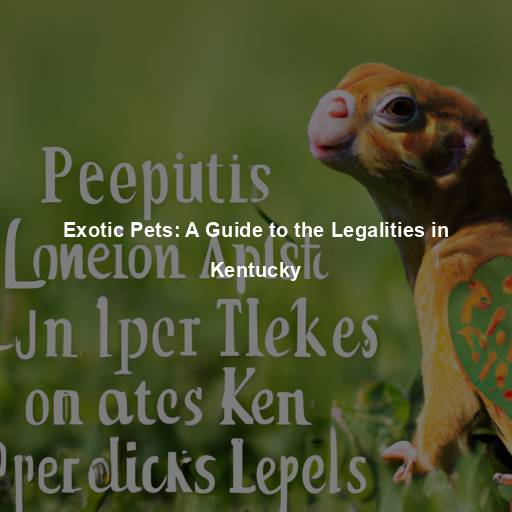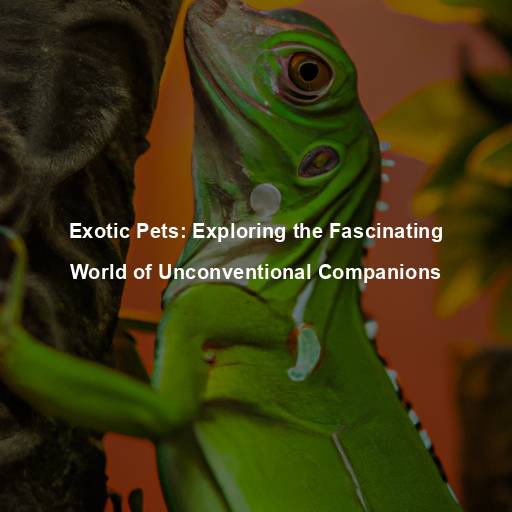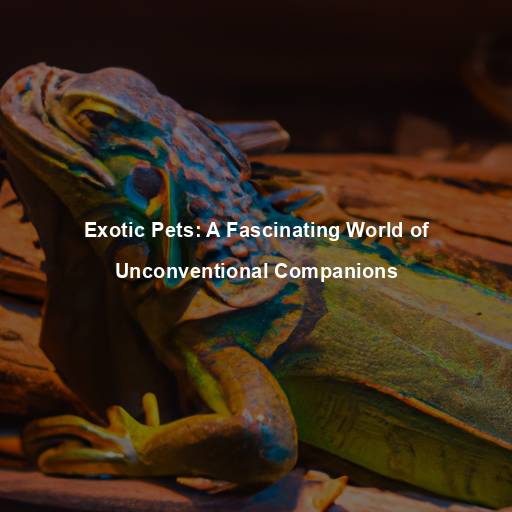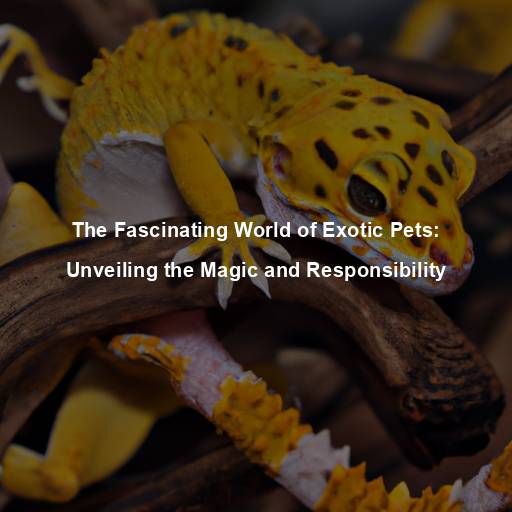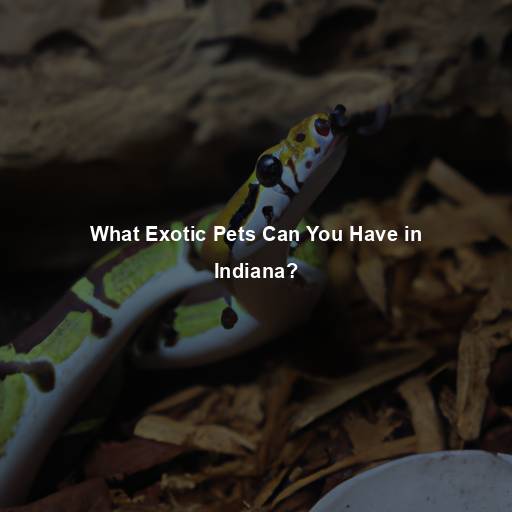Exotic Pets: A Guide to the Legalities in Kentucky
Last Updated on October 31, 2023 by Evan
Contents
- 1 Exploring the Fascinating World of Exotic Pets
- 2 Understanding the Legal Landscape
- 3 Navigating the Legalities of Exotic Pet Ownership in Kentucky
- 4 Responsible Ownership and Care
- 5 The Ethical Considerations of Exotic Pet Ownership
- 6 The Delightful World of Exotic Pets
- 7 The Responsibility of Exotic Pet Ownership
- 8 Celebrating the Splendor of Exotic Pets
- 9 FAQs – What Exotic Pets are Legal in KY?
- 9.1 Can I have a pet tiger in Kentucky?
- 9.2 Are venomous snakes allowed as pets in Kentucky?
- 9.3 Can I own a pet monkey in Kentucky?
- 9.4 Can I have a pet alligator or crocodile in Kentucky?
- 9.5 Are hedgehogs legal as pets in Kentucky?
- 9.6 Can I keep a pet fox in Kentucky?
- 9.7 Are sugar gliders allowed as pets in Kentucky?
- 9.8 Can I have a pet skunk in Kentucky?
- 9.9 Are there any restrictions on owning reptiles as pets in Kentucky?
Exploring the Fascinating World of Exotic Pets
When it comes to pets, many individuals are drawn to the idea of having something a little more unique, something out of the ordinary. This is where exotic pets come into the picture. From reptiles and amphibians to birds and small mammals, these extraordinary creatures have captivated the hearts of pet enthusiasts around the world. However, it is crucial to understand that owning an exotic pet comes with its own set of responsibilities and legal considerations.
Understanding the Legal Landscape
Before embarking on the journey of owning an exotic pet, it is imperative to familiarize ourselves with the legal framework that governs these unique companions. Laws and regulations pertaining to exotic pets can vary significantly from state to state and even within different regions of the same state. In the case of Kentucky, the state has implemented specific laws to regulate the possession and ownership of exotic animals.
Kentucky’s Exotic Animal Laws
In Kentucky, the Department of Fish and Wildlife Resources (DFWR) is responsible for overseeing and enforcing the regulations related to exotic animals. The state has established a comprehensive list of exotic animals that are prohibited to be kept as pets without special permits or licenses. It is crucial for prospective exotic pet owners to be well-informed about these regulations to ensure compliance and the well-being of both the animals and the community.
Prohibited Exotic Animals in Kentucky
In the beautiful state of Kentucky, there are certain rules and regulations in place to ensure the safety and well-being of both humans and the fascinating creatures that inhabit our world. These laws proudly stand against the ownership of specific animal species without the appropriate permissions, for we understand that not all creatures are meant to be kept as pets or companions. The roster of prohibited animals in the Bluegrass State is extensive, encompassing a wide array of captivating beings that possess a certain allure but require a specialized care that only their natural habitats can truly provide.
- Tigers
- Lions
- Bears
Monkeys. These fascinating creatures have long captivated both scientists and nature enthusiasts alike, with their uncanny resemblance to humans and their playful antics. From the lush forests of the Amazon to the remote mountains of Asia, monkeys can be found in a diverse array of habitats, adapting to their surroundings with remarkable agility. Join us as we embark on a journey to unravel the enigmatic world of monkeys, exploring their intricate social structures, their astounding problem-solving abilities, and the profound impact they have on the ecosystems they call home. - Venomous snakes
It is essential to note that this list is not exhaustive, and prospective owners should consult the DFWR or legal professionals to obtain the most up-to-date information regarding prohibited species.
While Kentucky has restrictions on the ownership of certain exotic animals, it is important to understand that there are legal avenues available for individuals who wish to keep these pets. The state provides permits and licenses for individuals who meet specific criteria and adhere to the regulations set forth by the DFWR.
Obtaining Special Permits and Licenses
If you’ve ever dreamed of having an extraordinary companion from the forbidden realm of Kentucky’s restricted pet domain, fear not, for there exists a glimmer of hope. Obtainable through a process laced with intrigue and bewilderment, special permits and licenses are the keys that can unlock this elusive treasure. The Department of Fish and Wildlife Resources (DFWR) offers a narrow pathway to its sanctioned wonders, allowing those with noble intentions to curate educational experiences, exhibitions, and even pursue scientific research. But tread lightly, for the journey is fraught with complications and rigorous regulations, guaranteeing the well-being and harmony of both these mesmerizing creatures and the unsuspecting masses.
Educational Permits
Educational permits allow individuals or organizations to possess and exhibit exotic animals for educational purposes. These permits are typically granted to educational institutions, such as schools, colleges, and universities, as well as licensed educators who aim to educate the public about these unique creatures.
Exhibition Permits
When it comes to the captivating realm of animal exhibitions, the issuance of permits cannot be overlooked. These magical documents act as gatekeepers, granting permission to individuals and organizations seeking to showcase extraordinary creatures at public events. By bestowing upon us the assurance of expert handlers and safeguarded surroundings, these permits sprinkle a dash of certainty onto the mesmerizing canvas of exhibition wonders.
Scientific Research Permits
Obtaining scientific research permits is a crucial step for those dedicated to exploring the world of exotic animals. These permits serve as a gateway to dive into legitimate and ethical research, all while adhering to the ever-evolving web of laws and regulations designed to protect these unique creatures. With these permits in hand, scientists and institutions can embark on their perplexing and awe-inspiring journeys, shedding light on the mysteries of the animal kingdom with a sense of responsibility and wonder.
Responsible Ownership and Care
As we delve into the labyrinthine world of exotic pet ownership in the bluegrass state of Kentucky, we unveil a paramount revelation – responsible ownership and meticulous care reign supreme. These extraordinary creatures demand a bespoke approach, as their needs transcend the boundaries of ordinary pet care. Potential owners, take heed – the onus of meeting these idiosyncratic requirements is an imperative to ensure a harmonious coexistence with these marvels.
Extensive Research and Education
Considering the addition of an extraordinary companion to your abode? Don’t plunge headfirst into the cosmic realms of exotic pets without first unearthing the mysteries of the specific species that captivates your curiosity. Unveil the secrets of their native havens, gastronomic inclinations, idiosyncratic mannerisms, and enigmatic maladies to fashion a sanctuary tailored to their unique disposition and safeguard their flourishing.
Qualified Veterinarian Care
In the realm of pet care, navigating the world of exotic animals warrants a journey filled with perplexity and seemingly insurmountable twists. To ensure optimal well-being for these unique companions, the services of a qualified veterinarian well-versed in the art of exotic creatures are of paramount importance. Their peculiar medical needs, distinct and unparalleled, must be tended to with meticulous precision – a stark deviation from the norms of conventional pet healthcare. Vigilant check-ups, a bountiful supply of vaccinations, and a keen eye for early detection enable a harmonious existence, bolstering their vitality and unyielding joy.
Proper Enclosures and Enrichment
As passionate animal enthusiasts, we understand the importance of creating the perfect haven for our exotic companions. Imagine a world where their every need is met, where space is ample, temperature and humidity levels are just right, and opportunities for exercise and mental stimulation abound. We must not overlook the significance of enrichment activities, for these not only prevent boredom but also nurture their innate behaviors. So let us embark on a journey to unlock the secrets of an exquisite habitat that fulfills all the perplexing needs of our cherished creatures.
Reptiles: Cold-Blooded Companions
Step into the captivating realm of exotic pets and discover the allure of reptiles. Their vibrant hues and mesmerizing movements create a kaleidoscope of wonder for enthusiasts. But be prepared to embark on a journey of dedication, as these cold-blooded companions demand meticulous care for their environment, feeding habits, and maintaining the ideal temperature. Exploration awaits as you uncover the mysteries of reptilian delights.
Habitat and Enclosure
When it comes to designing the perfect home for our scaly friends, it’s all about bringing the wild indoors. By mirroring the intricacies of their natural habitat, we unlock the secret to their happiness. Crafting the right combination of lighting, temperature variations, and moisture levels is the key to success. Dive into the fascinating world of reptiles and uncover the unique requirements of your chosen species to guarantee a living space that takes their breath away.
Diet and Nutrition
Reptiles have diverse dietary requirements, ranging from herbivorous to carnivorous. It is crucial to offer a balanced diet that meets their nutritional needs. Some reptiles may require live prey, while others thrive on a diet of fruits, vegetables, and commercially available reptile food.
Avian Companions: Feathered Friends
Throughout history, the captivating allure of birds as domestic companions has enchanted countless hearts, their resplendent feathers and harmonious melodies transcending mere aesthetics. Yet, indulging in the world of exotic avian companionship necessitates a profound comprehension of their idiosyncratic requirements, be it a meticulously crafted menu that caters to their discerning palates, engaging and stimulating their intellect, or fostering a robust camaraderie that satisfies their innate social cravings. In this bewildering mosaic of aviculture, one must navigate the intricate labyrinth of avian enchantment with unwavering dedication and discernment.
Dietary Considerations
Birds have specific dietary requirements that must be met to maintain their health and vitality. A balanced diet for an exotic bird typically includes a variety of fresh fruits, vegetables, high-quality pellets, and occasionally, small amounts of seeds. Consult with an avian veterinarian to ensure you are meeting your bird’s nutritional needs.
Mental Stimulation
Experiencing the brilliance of exotic birds is like unraveling a captivating mystery, as their intelligence knows no bounds. To ensure their dazzling minds stay sharp, a delightful array of toys, brainteasers, and interactive marvels are the secret ingredients. Engaging them in social escapades and granting them the freedom to explore beyond the confines of their cages also nurtures their happiness and overall vitality.
Small Mammals: Pocket-Sized Companions
When it comes to quirky and captivating pets, small mammals like hedgehogs, sugar gliders, and ferrets have stolen the hearts of animal enthusiasts everywhere. Their undeniable cuteness and one-of-a-kind qualities have made them a hot trend in the world of exotic pets. But amidst the excitement, it’s important to remember that these little creatures have unique needs that must be attended to if we want to keep them thriving and content. So, let’s dive into the fascinating world of small mammal care and unravel the secrets to their well-being and joy.
Housing and Environment
Ensuring the well-being of our furry friends is paramount, and this starts with providing them a secure and cozy haven. Understanding the unique needs of small mammals is key, encompassing everything from the perfect bedding to enticing hiding places and avenues for exercise. Additionally, don’t overlook the vital aspect of regular enclosure maintenance, as it is pivotal in warding off unpleasant smells and upholding cleanliness. By embracing these measures, we can guarantee a blissful living environment that our precious companions deserve.
Specialized Diet and Nutrition
Each small mammal species has its own dietary needs. Research the specific nutritional requirements of your chosen pet and provide a well-balanced diet that includes a variety of fresh foods, specialized pellets, and occasional treats. Consult with a veterinarian who specializes in exotic pets to ensure you are meeting their dietary needs.
The Ethical Considerations of Exotic Pet Ownership
The allure of having an exotic pet can be irresistible, but it’s imperative to grapple with the moral complexity that comes with their ownership. Unveiling the underbelly of the exotic pet trade reveals a dark truth – the harrowing practice of snatching animals from their native homes, causing a jarring disruption to fragile ecosystems and placing some species at the precipice of extinction. Furthermore, these unconventional companions demand specific, diligent care and fare poorly in domestic habitats, leaving owners perplexed on how to provide for their unique needs.
It is crucial for prospective exotic pet owners to educate themselves about these ethical considerations and consider adopting or rescuing animals instead. Many exotic pet species find themselves in need of new homes due to various circumstances, and providing them with a loving environment can be a rewarding experience.
The Delightful World of Exotic Pets
There’s something undeniably captivating about exotic pets, don’t you think? They offer us a tantalizing glimpse into the diversity of the animal kingdom, a world so wonderfully different from our own. But here’s the thing: owning an exotic pet is not for the faint of heart. It requires responsibility, knowledge, and a deep understanding of the unique needs and legalities involved.
Prepare to be astonished as we unveil a mesmerizing world of extraordinary companions that defy convention. These enigmatic creatures, with their kaleidoscope of vibrant hues and captivating quirks, will bewitch even the most seasoned animal enthusiasts. Join us as we delve into the realm of the lesser-known exotic pets, unraveling the mysteries of their care and unlocking the secrets to a harmonious coexistence like no other.
Aquatic Wonders: Exotic Fish and Invertebrates
Aquariums can be a mesmerizing addition to any home, showcasing the stunning beauty of exotic fish and invertebrates. However, it is essential to understand the intricacies of maintaining a thriving aquatic habitat.
Tank Setup and Water Quality
Creating a suitable habitat for exotic fish and invertebrates involves setting up an aquarium with the correct size, filtration system, and appropriate decor. It is crucial to maintain optimal water quality by monitoring temperature, pH levels, and ammonia and nitrate levels.
Diet and Feeding
Discovering the diverse dietary preferences of exotic fish and invertebrates is like unraveling a fascinating puzzle. Carefully explore the unique requirements of your underwater companions to guarantee their nutritional satisfaction. Some aquatic beings may crave the thrill of live or frozen meals, while others flourish when indulging in the vast array of fish food options readily accessible in the market. Embrace the enigmatic nature of these captivating creatures as you delve into the world of aquatic nourishment.
Unconventional Companions: Amphibians and Arachnids
For those seeking a more unconventional pet experience, amphibians and arachnids offer a unique allure. Frogs, toads, and tarantulas are intriguing creatures that require specialized care.
Habitat and Environmental Conditions
Amphibians, such as frogs and toads, require a suitable habitat that mimics their natural environment. This includes providing appropriate temperature, humidity, and lighting conditions. Tarantulas, on the other hand, require an enclosure with proper substrate, hiding places, and regulated temperature and humidity levels.
Feeding and Nutrition
Amphibians and arachnids have specific dietary needs that must be met for their well-being. Research the specific dietary requirements of your chosen species and provide a varied diet that includes live or frozen prey, supplemented with calcium and vitamins as necessary.
Unusual Avian Companions: Exotic Bird Species
Step into the enchanting realm of avian wonder, where a treasure trove of exotic feathered companions awaits your discovery. While the parakeets and cockatiels have captured our hearts, there is a vast and diverse world of pet bird species that are shrouded in mystery and intrigue. Prepare to be astonished as you delve into this captivating journey beyond the familiar, unlocking the secret beauty of these mesmerizing creatures.
Specialized Care and Enrichment
Caring for exotic bird species can be a mesmerizing and bewildering journey, as these unique creatures demand a tapestry of specialized attention. In order to thrive, they crave an expanse of airy havens, brimming with enrichment that captivates their inquisitive souls. Regular doses of physical activity and tantalizing mental stimulations are vital, while a meticulously crafted diet becomes the pièce de résistance, garnishing their nutritional needs with precision and flair. This delicate dance of tailored care unveils the awe-inspiring complexity behind the magnificence of these avian wonders.
Understanding Vocalizations and Behaviors
Exotic birds are known for their remarkable vocalizations and complex behaviors. It is important for owners to understand and appreciate these traits, as well as provide outlets for their natural behaviors, such as flying and foraging.
The Responsibility of Exotic Pet Ownership
Having the privilege of owning an exotic pet comes with a hefty dose of responsibility that should never be overlooked. We must raise awareness about the crucial role of responsible pet ownership and the profound impact it has on the overall well-being of these unique creatures and their delicate ecosystems. It’s perplexing to imagine the consequences of neglecting this duty, as it can disrupt the fragile balance of nature. Let us not underestimate the importance of being responsible stewards for these extraordinary animals, for they deserve nothing less than our utmost care and consideration.
Thorough Research and Education
Exploring the realm of exotic pets is a journey that demands a dazzling dose of dedication. Immerse yourself in the enigmatic world of research, where unraveling the enigmatic tapestry of each species’ peculiar needs awaits. Unlocking the secrets of their native habitats, supernaturally tailored diet plans, idiosyncratic behavioral patterns, and the perplexing realm of potential health hurdles will guide you towards becoming the ultimate guardian of these mysterious creatures. Embrace the perplexity, dive deep into the ethereal realm of knowledge, and let your home transform into a sanctuary of enigmatic enchantment.
Finding Reputable Breeders or Rescues
When it comes to adding an extraordinary companion to your life, it’s crucial to tread the path of prudence by seeking out reliable breeders or exploring the noble act of adoption through rescue organizations. These noble breeders are fervently dedicated to the well-being and vitality of their precious creatures, while embracing adoption unleashes a boundless reservoir of compassion towards animals longing for a caring haven.
Regular Veterinary Care
Taking care of exotic pets is a captivating journey filled with unexpected twists and turns. These extraordinary creatures require the expertise of a specialized veterinarian to navigate their unique needs. By securing routine check-ups with the right professional, you’ll embark on a path of guaranteed health and well-being for your extraordinary companion. Prepare to be amazed by the allure of exotic pet ownership and the wonders that await you on this extraordinary voyage.
Celebrating the Splendor of Exotic Pets
Exotic pets bring a sense of wonder and fascination to our lives. Their unique characteristics and captivating beauty have the power to transform our homes into miniature jungles or underwater wonderlands. By approaching exotic pet ownership with knowledge, responsibility, and respect for the animals and their natural habitats, we can create a harmonious and enriching environment for these extraordinary companions.
FAQs – What Exotic Pets are Legal in KY?
Can I have a pet tiger in Kentucky?
Unfortunately, Kentucky residents are not allowed to keep tigers or any other big cat as pets. This is because these magnificent creatures pose a significant danger and need specific care and accommodations that are simply not feasible within a domestic setting. The state’s authorities, like the Kentucky Department of Fish and Wildlife Resources, have implemented strict regulations to protect both the public and the well-being of these animals.
Are venomous snakes allowed as pets in Kentucky?
No, keeping venomous snakes as pets in Kentucky is strictly regulated. Only individuals who possess a state-issued permit, such as licensed herpetologists or those with educational or research purposes, are allowed to keep venomous snakes. This requirement helps prevent potential risks and ensures that proper handling and safety measures are in place.
Can I own a pet monkey in Kentucky?
Owning a pet monkey in Kentucky is legal, but it is subject to certain restrictions. Certain species of monkeys, such as Capuchins and Squirrel monkeys, are commonly allowed to be kept as pets with the proper permits and documentation. However, other primate species may be prohibited due to their endangered status or the potential for public health concerns. It is important to research and adhere to the specific regulations regarding owning primates in Kentucky.
Can I have a pet alligator or crocodile in Kentucky?
No, owning alligators or crocodiles as pets in Kentucky is generally prohibited. Kentucky law states that no person may possess a wild-caught crocodilian species. Exceptions exist for educational institutions, research entities, and licensed exhibitors who may require specific permits to possess these animals for non-domestic purposes.
Are hedgehogs legal as pets in Kentucky?
Have you ever wondered if you can legally own a hedgehog as a pet in Kentucky? Well, fret not, my curious friend, for I bring you tidings of great delight! Indeed, the majestic hedgehog is indeed allowed to grace the homes of the residents of the Bluegrass State. However, let us not be hasty in our jubilation, for there lies a twist in this tale of legality. We must not forget the whims of local authorities, who may impose their own regulations and restrictions on the ownership of these prickly companions. Therefore, I implore you to venture forth and make inquiries with the distinguished folks of your particular city or county before embarking on this enchanted journey of hedgehog companionship.
Can I keep a pet fox in Kentucky?
Unfortunately, owning a fox as a pet in the beautiful state of Kentucky is strictly prohibited. These charming creatures are protected as native wildlife and consequently are under the watchful guardianship of the esteemed Kentucky Department of Fish and Wildlife Resources. Despite their undeniable allure, foxes are not suited to being domesticated, as their distinctive requirements and potential threat to local wildlife poignantly pose a perplexing conundrum.
Are sugar gliders allowed as pets in Kentucky?
Yes, sugar gliders are legal to own as pets in Kentucky without any special permits or licenses. However, responsible ownership is still necessary. Sugar gliders are social animals and require proper care, diet, and attention. It is important to ensure they have a suitable living environment and meet their specific needs for a happy and healthy life.
Can I have a pet skunk in Kentucky?
No, owning a pet skunk is not permitted in Kentucky. The state considers skunks to be wildlife and not suitable for domestication. Attempting to keep a skunk as a pet without the necessary permits is against the law and may result in legal consequences.
Are there any restrictions on owning reptiles as pets in Kentucky?
Navigating the legal landscape of reptile ownership in Kentucky can be a dizzying experience. Although there are no blanket restrictions across the state, it’s a wild rollercoaster ride discovering the varying regulations lurking in different cities and counties. To avoid any unexpected bumps in the road, I highly recommend reaching out to local authorities or tapping into the wisdom of the Kentucky Department of Fish and Wildlife Resources to stay on the right side of the law.
Please note that this information is provided as a general guideline, and it is important to thoroughly research and understand the specific regulations and permits required for owning exotic pets in Kentucky.

